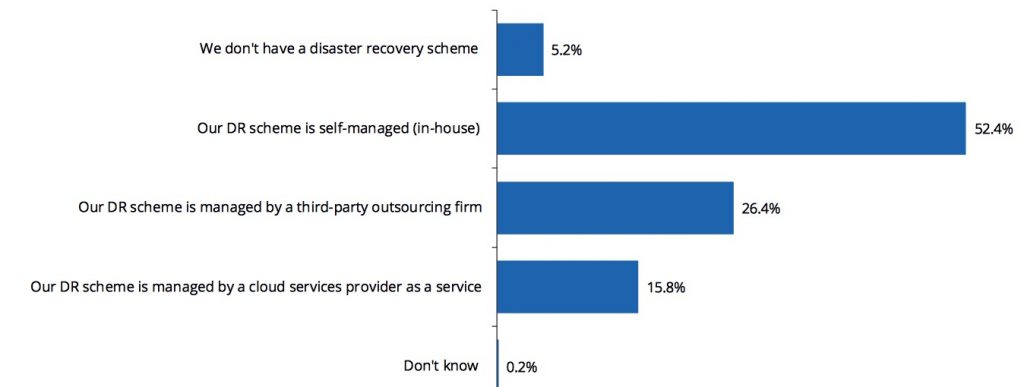49% of Businesses Suffered Unrecoverable Data Event in Last 3 Years
IDC research sponsored by Zerto
This is a Press Release edited by StorageNewsletter.com on August 23, 2018 at 2:16 pmZerto Ltd announced the findings of the IDC white paper, sponsored by Zerto, State of IT Resilience.
The study revealed that over 90% of respondents do not consider their organization to be IT resilient and nearly half have suffered an unrecoverable data event in the last three years.
While the majority of businesses surveyed have a cloud, digital transformation or modernization project already planned for the next two years, these same businesses rate themselves as immature on resilience objectives. This gap highlights the current demands on IT teams who are being tasked with cloud and modernization projects even as they struggle to keep pace with basic protection and recovery. Additionally, 77% of those surveyed have suffered organizational impact from a tech-related business disruption in the past two years. The survey results validate that only with resilient operations can businesses mitigate the risk of downtime and focus on projects that drive transformation.
Key findings from the research include:
Significant gaps revealed between desired and existing state of operations
• 90% of organizations think data protection is important or critical for digital and/or IT transformation projects, yet the technological provisions are not in place to provide this level of data protection assurance.
• Only 7% rate themselves as mature for business resilience.
• Nearly half – 49% – have suffered an unrecoverable data event in the last three years.
Ensuring that the entire IT infrastructure is resilient will be critical for business success and for completion of transformation, modernization and cloud projects.
Businesses are putting themselves at risk
For organizations that experienced technology-related disruptions in the last two years, the consequences were significant.
• 93% have experienced a technology-related business disruption in the past two years. Of these disruptions, 77% suffered some organizational impact.
• 79% lost money either directly or through paying for additional recovery expertise.
• 20% permanently lost customers as a result of the disruption.
This risk is only going to become larger as disasters encompass broader categories of disruption, including malicious attacks.
• 77% have experienced a malicious attack in the past 12 months. Of this group, 89% have succumbed to an attack with 39% having suffered five or more data corrupting events.
IT resilience spending and training will increase
IT resilience needs to be a key strategic priority for any forward-thinking organization and data protection needs to be top of mind for organizations in this resilience effort.
• More than 55% of businesses expect the complexity of data protection to increase, and having multiple tools only enhances this complexity.
• To meet this growing complexity, 85% plan to hire and/or train more staff, and 94% expect to spend more on IT resilience in the next 24 months.
• Cloud was also highlighted as an essential part of IT resilience, as cloud-based data protection was the highest-rated IT initiative over the next 12 months.
Disaster Recovery Schemes Managed In-House Will Become Increasingly Burdensome

“The study revealed much lower levels of IT and business resilience than anticipated. Across the industry, we are seeing the approach to data protection evolving from individual backup, DR and mobility solutions into a more unified approach, to ensure data is protected comprehensively, anywhere, at all times. In the multi-cloud era, this combined approach will be integral to raising the maturity of resilience technology in businesses, and protecting organizations from the many significant risks of disruption,” said Phil Goodwin, research director, IDC.
“From this research, it’s clear – and concerning – that many organizations do not have the right technology to protect themselves in the evolving current digital era. The rapidly growing data protection concerns, as well as succeeding as an always-on business, are two factors that are driving a new approach to IT and business resilience. From my experience, simply buying another product to fix the issue only creates more problems and still leaves the business vulnerable to technology disruptions and malicious attacks in the near future. As a CIO myself, I advise IT teams to focus on simplifying their technology portfolio, searching out converged solutions that can manage their entire IT resilience operation – cloud mobility, backup and DR – from a single viewpoint,” said Avi Raichel, CIO, Zerto.
Methodology
IDC Research surveyed 500 senior-level IT and business managers representing over 10 unique industries and companies of all sizes and geographies about the challenges to achieve IT resiliency and its importance to digital transformation.













 Subscribe to our free daily newsletter
Subscribe to our free daily newsletter

